
Volume
27, No. 2 – February 2014
Volume 27, No. 2
Editor: Stephen L. Seftenberg
Website:
www.CivilWarRoundTablePalmBeach.org
President’s Message
Thank you for your positive and enthusiastic response
for the Daniel Sickles Program that Bill McEachern and I did at the
January meeting. The idea for our program came from a conversation that
we had just before one of the Round Table meetings. If you have any
thoughts on a program or would like to present one, please contact me or
talk to me before the meeting.
DUES ARE DUE
Dues unpaid as of March 1, 2014 will no longer
receive the Newsletter.
ELECTION RESULTS
Elections were held in January and this is the list of current
officers. President, Gerridine LaRovere (e-mail honeybell7@aol.com or
561 967-8911) Vice President, Dr. George Nimberg Secretary and
Newsletter Editor, Stephen Seftenberg (e-mail seftenberg1020@gmail.com
or 561 689-7785) Treasurer, Robert Krasner Director, Monroe Ackerman,
Morris Ball, and Janell Bloodworth
REFRESHMENTS
Coffee and... The Round Table supplies the coffee and each
member is asked to bring a refreshment one time during the year to a
meeting. The list will be passed around at the February meeting. Please
sign up for the month you would like to bring a refreshment.
ANNOUNCEMENT
On Wednesday, February 11th, our own Robert Krasner is going to
present a talk on "Lincoln and the Railroads" at 1:00 PM, in the
Palm Beach County Main Library, 3650 Summit Boulevard, West Palm Beach,
Florida. Call 233-2600 for details. Robert is known for presenting
well-organized, interesting talks.
February 12, Program
Lawrence Hewitt, who has been a professor of history and has
published many books and articles on the Civil War, will present a talk
entitled, Civil War Myths and Mythmakers, exposing blatant
fabrications, tall tales and shameless self-promotion by generals,
newsmen and photographers. Sounds interesting.
January 8, 2014 Program
The New York Times - Palm Beach B ureau
All the news that fits we print
January 8, 2014
Daniel Sickles: Lawyer, Soldier, Politician, Diplomat,
and ‘Ladies Man’ Visits West Palm Beach to "Reposition" Himself
West Palm Beach, Florida
By Lavinia Lovejoy Lawrence, Bureau Chief
This is an exclusive interview with the late Daniel Edgar Sickles
(October 20, 1819 - May 3, 1914). My questions will be in plain type and
Sickles’ answers will be in italics. Why are you calling this a
"repositioning visit?"
 I
was buried in Arlington National Cemetery but think, as the hero who won
the Battle of Gettysburg, was awarded the Medal of Honor and who lost a
leg to a cannon ball, I should be buried near the New York monument in
Gettysburg National Cemetery. That is why I have come back. I
was buried in Arlington National Cemetery but think, as the hero who won
the Battle of Gettysburg, was awarded the Medal of Honor and who lost a
leg to a cannon ball, I should be buried near the New York monument in
Gettysburg National Cemetery. That is why I have come back.
Before we get into that, there seems to be discrepancies with respect
to your birth date and name. You now claim it was October 20, 1819, but
George Taylor Strong says you were born before your parents married.
Also, the name on your birth certificate was ‘van Sickelns." Care to
explain?
Slander, pure and simple.
You were born to wealthy parents. Your mother was a 6th generation
"Knickerbocker." However, you had an "uneven" childhood, dropping out of
school and running away from the family farm to work in Princeton, New
Jersey as a printer, a job you lost when you were accused of stealing
$100.
I did not take the money. In 1837, my parents sent me to live with
Professor Lorenzo DaPonte (whose father had been librettist for three of
Mozart’s operas). Lorenzo recognized my intellectual qualities. His
daughter, Maria, was then married, but we fell in love. The result was a
child, Teresa. When Lorenzo died, I almost went mad with grief. I
eventually recovered and took up law. I studied law under two powerful
New York attorneys, Benjamin Franklin Butler and James Buchanan. I soon
opened my own firm and with Butler’s help became a member of Tammany
Hall, a powerful political machine.
I understand that you tried a case before you were admitted to the
bar in 1846.
A mere technicality. I was perfectly capable of trying and winning
the case! With Butler’s help, I was introduced to Tammany Hall.
While you earned good money, the money never seemed to stick to your
hands and you were often in debt. Can you explain?
I admit that I was never careful with money. I loved the "sporting
life – women, gambling, good cigars, wine and whiskey."
Several people alleged that you embezzled trust funds, pledged a deed
to property you did not own as collateral for a loan and diverted funds
raised for a political campaign to your personal use.
Please notice that I was never disbarred nor prosecuted in these
cases.
That may be true, but in one case when you were brought before the
grand jury on criminal charges, "strong political influence" was brought
to bear to clear you. I note, moreover, that after you were
elected to the New York State Assembly in 1847, you were censured for
bringing your "good friend," Fanny White, who operated a house of
ill-repute, onto the floor of the floor of the Assembly.
Those straight-laced Whigs were behind the times!
It was even rumored that you traded Fanny’s sexual favors for
political favors.
Prove it.
In 1848 you supported Franklin Pierce, who was nominated and won the
Presidency, even though your mentor and good friend, James Buchanan was
also running for the same office.
That’s politics. Notice that in 1853, when President Pierce appointed
Jimmy as Ambassador to England, he appointed me as Jimmy’s assistant,
even though my salary hardly paid for my wine and cigars.
In 1853, as corporate counsel to the City of New York, you were
instrumental in creating Central Park and the Central Park Zoo, but even
then you sought to enrich yourself and the other members of a syndicate
by buying up land around the proposed park before going public with the
park proposal.
I see nothing wrong with seeking to profit while doing good. Note,
please, that the syndicate failed and I made nothing.
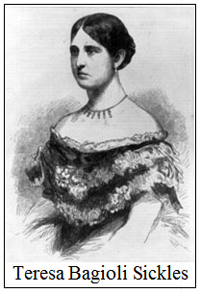 In
1852, you married a 16-year old girl named Teresa Bagioli, who soon had
a daughter, Laura. Laura was too young to accompany you to England, so
you left your wife and daughter behind and took Fanny White with you
instead. You introduced Fanny to Queen Victoria as "Julia Bennett," a
mocking reference to his hated enemy, Gordon Bennett, owner of the
New York Herald. In
1852, you married a 16-year old girl named Teresa Bagioli, who soon had
a daughter, Laura. Laura was too young to accompany you to England, so
you left your wife and daughter behind and took Fanny White with you
instead. You introduced Fanny to Queen Victoria as "Julia Bennett," a
mocking reference to his hated enemy, Gordon Bennett, owner of the
New York Herald.
I enjoyed doing that.
In 1854, you created a cause célèbre at a Fourth of July
dinner for 150 Americans and Englishmen, hosted by George Peabody that
threatened to upset U.S. - England relations.
I am a patriot and I was incensed by various slights such as putting
a tiny picture of George Washington between life-sized portraits of the
Queen and the Prince Consort, hanging a small portrait of President
Pierce in a remote corner and deleting lines from the Star Spangled
Banner that might embarrass the British. I stayed seated for the toast
to Queen Victoria and then left the dinner Fortunately, by this time my
wife, Teresa, who spoke five languages, had joined me in England and
smoothed Buchanan’s feathers.
Explain your role in the Ostend Manifesto.
Jimmy took me along to a meeting in Ostend, Belgium of the American
ministers to England, France and Spain to consider the "Cuban Problem."
I helped draft the Ostend Manifesto which stated that the U.S. should
acquire Cuba, preferably by diplomacy or dollars, but if necessary, by
force. Cuba could then join the Union as two slave states, balancing the
free states being admitted.
The manifesto stirred up a storm of protest from other nations and
angered many Northerners, who saw it as an effort to perpetuate Southern
and Democratic control of Congress, the President and the Supreme Court.
Care to explain?
You have stated my purpose quite clearly.
Back in the United States in 1855, you were named as chairman of
Tammany Hall’s executive committee, a truly powerful position. You won
consecutive terms in the New York state senate in 1856 and 1857 and then
entered national politics, serving from 1857 to 1861 as a Democrat in
the U.S. House of Representatives. In 1856 you helped James Buchanan win
the Presidency. In Washing-ton, you rented the Stockton Mansion for
$3,000 a year. Rumor had it that a New York steamship company underwrote
your lease.
No comment.
Now we come to Phillip Barton Key, son of Francis Scott Key and
nephew of Chief Justice Taney.
Teresa and I met Mr. Key, known as Barton, then the District
Attorney of the District of Columbia, at President Buchanan’s Inaugural
Ball. He was a very handsome widower who moved in the highest circles in
Washington. It made sense to cultivate him. We soon were very socially
active, with Teresa hosting receptions every Tuesday and dinners every
Thursday. The only downside was that I had to travel a lot. While I was
unavailable, Barton was glad to escort Teresa to plays, symphonies,
horseback rides and parties.
Care to explain your frequent trips to Baltimore to the Barnum Hotel,
where you entertained different ladies in your room? Was this fair to
your wife?
In my time, the rules for men and women were different. Husbands
could enjoy the sporting life while the “weaker sex” was expected to
stay home and take care of domestic and social duties. Fairness doesn’t
enter into it, it’s just the way the world was then.
Now comes a traumatic moment in your life. What does the number 383
mean to you?
Oh 383, that evil foul number. That was the street address of the
house that Barton rented and in which he seduced my innocent wife.
You get an anonymous letter implying that your wife and Barton are
having an affair. What did you do?
I asked my friend, George Wooldridge, to investigate. While Barton
denied everything, his neighbors said that my wife was seen entering his
house on numerous occasions. In addition, Barton would stand in front of
my house while I was away and wave a white handkerchief. If the coast
was clear, he would enter my house and consort with my wife. The very
next day, February 25, 1859, I got Teresa to confess in writing, to her
adultery.
Then, while I was conferring with Wooldridge and another friend, Sam
Butterworth, I saw Barton outside waving his damned handkerchief. I got
two derringers and went outside to
 confront the scoundrel. I remember
saying, “Key, you scoundrel, you have dishonored my home–you must die!”
We scuffled and he went into his pocket for something. I immediately
fired my derringer striking him in the groin. I then fired point blank
into his chest. I tried to shoot him in the head but the derringer
misfired. I remember asking, “Is the scoundrel confront the scoundrel. I remember
saying, “Key, you scoundrel, you have dishonored my home–you must die!”
We scuffled and he went into his pocket for something. I immediately
fired my derringer striking him in the groin. I then fired point blank
into his chest. I tried to shoot him in the head but the derringer
misfired. I remember asking, “Is the scoundrel
dead?” I was arrested and thrown into a dreadful jail cell. Eventually
he died and I was tried for murder.
I
understand you hired a "dream team" of lawyers, led by Edward Stanton.
Yes. My eight lawyers put forth many theories in my defense,
including the unique theory of "temporary insanity," This was the first
time this defense was raised and it must have been effective, because
the jury took only 70 minutes to find me Not Guilty. I went home and
took all of Teresa’s jewelry, including her wedding ring and told her
she was no longer my wife. I didn’t divorce her because that would have
hindered my political plans. Some time later I reconciled with Teresa.
Where I had been hailed for defending my marriage, I was now ostracized
for taking an erring wife back. Mary Chesnut, in her diary, wrote that I
had contracted "social smallpox." I did not run for reelection as I
could not have won.
Let’s turn to the Civil War. Prior to secession, you had voted with
the Southern bloc even against the economic interests of your district,
but when the Southern states left the Union, you became a "War
Democrat." Why?
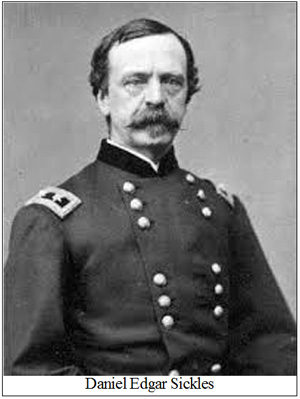 I
saw the war as an opportunity to rehabilitate my reputation and personal
glory. I got the Republican governor of New York to authorize me to
raise a brigade of five regiments but within a month 29,000 men had
volunteered! I named the brigade the "Excelsior Brigade," which
infuriated up-state Republicans. Thanks to the generosity of my friend
August Belmont, I took my men to the Belmont Race Track and used its
infield as a training camp. When the governor ordered me to disband my
brigade, I got Edward Stanton, then Secretary of War, to federalize my
regiment. I was offended when I was not appointed general, as was the
custom when people raised brigades they paid for. I
saw the war as an opportunity to rehabilitate my reputation and personal
glory. I got the Republican governor of New York to authorize me to
raise a brigade of five regiments but within a month 29,000 men had
volunteered! I named the brigade the "Excelsior Brigade," which
infuriated up-state Republicans. Thanks to the generosity of my friend
August Belmont, I took my men to the Belmont Race Track and used its
infield as a training camp. When the governor ordered me to disband my
brigade, I got Edward Stanton, then Secretary of War, to federalize my
regiment. I was offended when I was not appointed general, as was the
custom when people raised brigades they paid for.
Then fate intervened. It appeared that Mrs. Lincoln had leaked one of
Mr. Lincoln’s speeches to a reporter who put it in his newspaper. The
resulting scandal threatened to wound the Lincolns. I found a way out by
inducing a White House gardener to say he had memorized the speech and
repeated it to the reporter. A grateful President promptly appointed me as a
general!
Tell us about your Civil War exploits.
I led my men in the Battle of Seven Pines and the Seven Days Battle
and I performed creditably. At the Battle of Chancellorsville, however,
I obeyed Joe Hooker’s order moving me off good defensive ground even
though I vigorously opposed doing so. At the Battle of Gettysburg, I did
just the opposite, disobeying George Meade’s orders to stay in line and
instead moved my men one mile forward to what I believed to be a better
defensive position. When Meade came to my headquarters and ordered me to
return to my original position, which I was prepared to obey when the
rebels attacked. My men and I fought valiantly and, aided by
reinforcements sent by Meade, held the field.
Some historians say your move risked disaster to Meade’s plan of
battle, while others say it blunted the Confederate attack and that your
unwise move may have unwittingly foiled Lee’s hopes.
To this day, I think my action was proper, that it even saved the day
and that I was the "Hero of Gettysburg." I was even given the Medal of
Honor!
Thirty-four years later. Any chance that you would be court-martialed
ended when a rebel cannon ball took off your left leg? You were put on a
stretcher, lit a cigar and told your men that "I would be back." You
insisted on being taken to Washington, where you promptly spread your
version of the battle and attacked Meade then and after the war as a
coward who wanted to retreat after the first day. President Lincoln and
his son Tad even visited you.
I’ll let history decide.
Tell us what happened to your amputated leg.
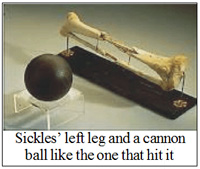 I
knew that the Surgeon General had been ordered to collect "specimens of
morbid anatomy," for the Army Medical Museum, so I ordered the bones of
my leg to be shipped to the museum. I
knew that the Surgeon General had been ordered to collect "specimens of
morbid anatomy," for the Army Medical Museum, so I ordered the bones of
my leg to be shipped to the museum.
It has been reported that you visited your leg on July 2 for many
years thereafter.
That is so.
One small incident: you met a woman in 1863 who gave birth to a baby
girl she called "Our little Julia."
Silence.
OK. Let’s switch back to your domestic life. You and your wife and
daughter lived in separate homes in New York. You even vacationed in the
Adirondacks without them.
Let’s get on with this.
In the fall of 1863 a ball was held in your honor and you stated,
"The army will prove that they who are fearless in conflict are generous
in victory." Many people took this as an opening move to run for the
Presidency.
Nonsense! I was simply following Mr. Lincoln’s ideas for postwar
policy.
In 1865 you were sent to Columbia on a secret mission to obtain
continued assurance it would allow Union troops to cross the Isthmus of
Panama.
I am fluent in Spanish and a friend of President Murillo, who had
been the Columbian minister in Washington before the war.
Your mission was a success when you heard about Lincoln’s
assassination and the attack on Stanton. You returned to Washington,
bringing with you some exotic animals for the Central Park Zoo. The war
was over. In 1867,
your wife, Teresa, died. Your friend President Grant
appointed you as the Commander of the Department of South Carolina.
This was an almost impossible assignment. Some freed slaves
confused freedom with never having to work again, allowing the fields to
lie fallow. I avoided mass starvation by having tons of army rations
sent to South Carolina. I was faced with a white population who feared
that giving the blacks the right to vote meant the blacks would treat
the whites the same way the whites had treated the blacks. The only good thing about this
assignment was that my daughter came to live with me. No one, white or
black had any money, so a flood of foreclosures ensued: 60,000 homes in
1865 and 1866, making up two-thirds of the homes in the state as I
issued General Order No. 10, freezing all foreclosures for a year. My
action was popular among the citizens but not the banks who got a
Federal judge to say my order was "improper." The
banks took it to a Federal judge who said my order was "improper."
When I refused to comply with this order, President Johnson removed
me from office, just as he was removing Edward Stanton from the office
of Secretary of War. I returned to Washington. The Radical Republicans
were in a life-and-death struggle with President Johnson which ended in
impeachment proceedings. I sided with Edward Stanton. I heard that
Senator Edmund Ross of Kansas was the swing vote and that he was going
to vote against impeachment, which would mean acquittal but was blocked
from seeing him by a young woman. Ross went on to vote for acquittal.
The vote was 37 for impeachment and 19 against. Since two-thirds vote
was required, President Johnson escaped impeachment. My friend Ben
Butler later held hearings that indicated that many acquittal votes had
been bought.
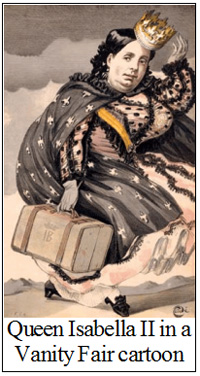 After
the war ended you retired from the Army and you friend President Grant
appointed you as Minister to Spain. As usual, you got into trouble by
engaging in a torrid love affair with Queen After
the war ended you retired from the Army and you friend President Grant
appointed you as Minister to Spain. As usual, you got into trouble by
engaging in a torrid love affair with Queen
Isabella II, who had been dethroned.
I had known Isabella from before the war. We were soul mates in
that she had given birth to five babies by five different men. My long
standing goal remained acquiring Cuba. I met with revolutionaries in my
house.
Wasn’t this illegal?
A mere technicality. To continue, Isabella was in Paris and I
went to Paris. My goal was to make her son, Alfonso XII, king. All my
efforts at king-making failed, but in 1871, I did meet and marry a
beautiful young French woman, Caroline de Creagh. I resigned as Minister
in 1874 and lived in Paris where Caroline gave me two children, Eda
Sickles and George Stanton Sickles.
In 1870, James McHenry retained you to oust Jay Gould and James Fisk
from control of the Erie Railroad Company
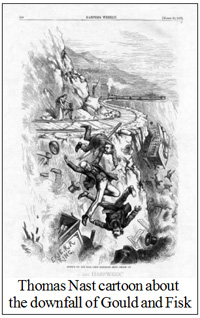 McHenry
was a shareholder in the Railroad, which had been gutted by Gould and
Fisk. Even abroad I continued to work against Gould and by 1873 I had
persuaded 11 of the 17 directors of the company to support McHenry’s
slate of directors and officers to oust Gould. The source of Gould’s
power was Boss Tweed. Just as my new wife and I arrived back in the
United States, Boss Tweed was arrested. I found a new ally in O. H. P.
Archer, vice president of the railroad, who called a meeting of the
board at the railroad’s headquarters in the Grand Opera Hotel. I
brought with me court injunctions, a brigade of police and a band of
hired toughs. Gould had his own "army" but was greatly outnumbered. Ultimately
Gould barricaded himself in some inner offices. I managed to talk to
Gould through the door and told him that if Gould resigned, the stock of
the railroad would go up by 15 points, which would be worth millions to
him. Out numbered and out maneuvered, Gould resigned. I was wrong about
the effect on the stock. It went up by 20 points! Naturally I also
profited from this outcome. McHenry
was a shareholder in the Railroad, which had been gutted by Gould and
Fisk. Even abroad I continued to work against Gould and by 1873 I had
persuaded 11 of the 17 directors of the company to support McHenry’s
slate of directors and officers to oust Gould. The source of Gould’s
power was Boss Tweed. Just as my new wife and I arrived back in the
United States, Boss Tweed was arrested. I found a new ally in O. H. P.
Archer, vice president of the railroad, who called a meeting of the
board at the railroad’s headquarters in the Grand Opera Hotel. I
brought with me court injunctions, a brigade of police and a band of
hired toughs. Gould had his own "army" but was greatly outnumbered. Ultimately
Gould barricaded himself in some inner offices. I managed to talk to
Gould through the door and told him that if Gould resigned, the stock of
the railroad would go up by 15 points, which would be worth millions to
him. Out numbered and out maneuvered, Gould resigned. I was wrong about
the effect on the stock. It went up by 20 points! Naturally I also
profited from this outcome.
You left your family in 1879 and did not see them again for 17 years.
May I say that you like being married but are unable to deal with
day-to-day family life?
Say whatever you want, young lady.
By 1879, you had finally found financial security and purchased a
spacious home at Fifth Avenue and 9th Street, decorated with military
and political memorabilia and animal heads and hides, but nothing
related to your family life. In 1880, you supported Grant for another
term as President, but after 36 ballots a "dark horse," James Garfield, won the
nomination and the election.
Yes, both Grant and I were left hanging out to dry. But don’t feel
sorry for me. My father died in 1881 and left me $5 million.
In 1883, at a Gettysburg reunion, you met James Longstreet. You
two became fast friends and each held that the other had acted well on
July 2, 1863. Longstreet even wrote you a letter in which he said that
you had blunted Lee’s attack and thereby won the battle.
 I have the letter with me. Would you like to see it?
Just when things looked good, you suffered reversals. Your daughter
Laura died in 1891 destroyed by drink and drugs. In 1889, you
lost $4 million in the stock market and reconciled with your wife,
Caroline, and your son, Stanton, but that effort foundered on your
inability to stop squandering money on young actresses.
You served as President of the State Board of Civil Service
Commission (1888-89), as Sheriff of New York (1890). You also served for
many years as Chairman of the New York Monuments Commission, but you
were forced out when $28,000 was embezzled.
I did not steal the money but I took full responsibility for the loss
and made up the loss with help from friends and from my own pocket, even
though this required my wife to sell her jewelry.
In
1893, you ran for Congress again on a platform that Democrats as well as
Republicans had won the Battle of Gettysburg. Your stump speech became
famous, reciting that the right wing was led by General Slocum, a
Democrat; the left wing was led by General Reynolds, a Democrat; and in
the Devil’s Den was a man named Sickles. You won and were able to have
legislation passed establishing the Gettysburg National Military Park.
General, virtually every other General on both sides of this battle has
a monument erected in his honor, but not you. Why?
I don’t need a marble statue, the whole battlefield is a monument to
me.
In 1908, you almost lost your house to the Sheriff but were able to
talk him out of seizing it. You were buried in an avalanche of
creditors’ suits and your health began to fail. You died May 3, 1914 at
the age of 94 (or was it 97 or 91?). Your funeral rivaled that of a
President’s funeral and you were buried in Arlington National Cemetery.
Yes, and I have come back to life to get my bones moved to
Gettysburg!
Last changed: 01/23/14
Home
About News
Newsletters
Calendar
Memories
Links Join
|

